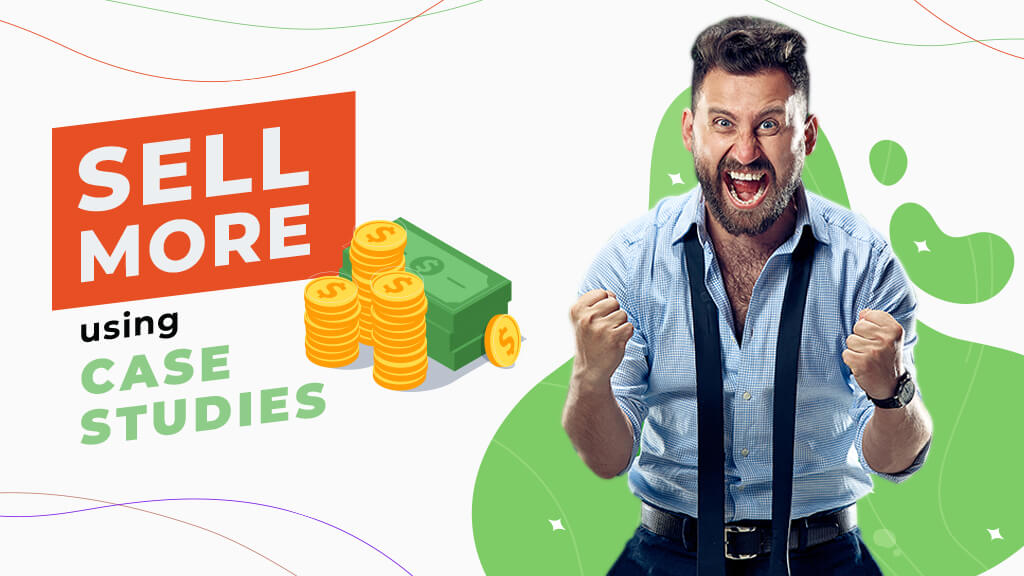

We’ve all been looking for a product or service at one time or another and have found it quite hard to choose the one that we’re going to spend our hard-earned money on. There’s a lot of options out there.
Of course, who we end up choosing can come down to many different factors.
Maybe the marketing is spot on or the people behind it really seem to get you, maybe the copywriting is absolutely gripping and you can’t imagine going to anybody else.
However, there’s another handy tool we are going to talk about today that has been proven to help businesses worldwide become the ones that those potential clients choose, giving them the ability to grow and scale.
That handy tool is called Case Studies.
To dive deep into this extremely effective marketing tool, Will Wang recently returned to James Schrako’s SuperFast Business podcast to discuss how case studies can benefit your sales. Everything that comes with using them, and what to avoid doing.
Let’s get started.
The Basics Of Case Studies
Before we go any further, let’s go through what a Case Study actually is.
Will says that he sees a case study as a way to tell a story about your business that isn’t from your own perspective or personal experience.
It’s quite common to see marketing efforts from businesses that are full of recounts of how fantastic their own product and service is, showing you tons of grandiose copy of how great they are and how they are far better than their competitors.
When you see this all the time, the impact wears off rather quickly.
It’s far more impactful to have an engaging story about the merits of your product or service come from a third party who has experienced it firsthand.
The best case studies are the ones that tell the story of a client who has had a positive transformation using your product or service.
An experience that really helped them and stuck with them.
Like a great story, it draws the reader in, takes them on a journey, and leaves them with an idea of exactly what to expect if they decide to become a client of yours.
It’s an innovative way to let people know what you’re about without adhering to the tropes of sales and marketing writing.
Benefits Of Case Studies
Something case studies can do really well is draw the reader closer because they relate to it. It bridges the gap between the reader and the storyteller, making it hit close to home.
For example, if you have someone with 10 years of experience and a large network who is giving some advice and talking about how it’s worked well for them, it might seem out of reach for a listener just starting out in the same field.
In place of this, if you tell a story about somebody that started with nothing and followed that same advice to achieve success, it’s much easier for somebody new to relate to.
Case studies, according to Will, are also extremely useful for businesses who are operating in a competitive market, such as a digital marketing agency or a coaching business.
In regards to online coaching, there is a lot of misinformation and low-quality coaches, so it’s a fantastic idea to get a good amount of real case studies as quickly as you can to stand out from the competition and prove to the potential client that you can get them results.
In addition, Will also believes that businesses with complicated products where it isn’t immediately apparent what they do can also benefit from case studies.
This could be a product like a piece of software that needs to be explained as to why and how it’s going to be beneficial to your business.
Case Studies are very powerful for these types of products.
Instead of boring the reader with all the specifics and features about the product, it goes straight into the end result of what the product actually does, spoken from someone else’s point of view.
As mentioned in the podcast, “if you sell something complicated, make it sound simple. If you sell something simple, make it sound complicated”.
It’s a classic copywriting maxim.
But I Don’t Have Any Case Studies?
When you’re starting out, you’re probably not going to have any case studies of value and success stories you’ve provided for clients.
Therefore, a common thing people in this position do is use stories of other successful businesses in their industry and apply that to what they are trying to do for their clients.
When Will started Growth Labz, he didn’t have any case studies.
Instead, he was using the method we just mentioned above.
However, once you have case studies of something that you’ve done yourself for your clients, use it immediately.
It’s much more powerful.
How to ask someone for a Case Study
Due to the nature of case studies, asking somebody if you can write a case study about them can sometimes prove to be more complicated than it initially sounds.
Think about it like this.
If you perform an incredible service for a client and provide them with something that is of high value to them, there are times they might want to keep you a secret. Stay ahead of the competition, right? What’s the point of giving away the in and outs of your business?
In saying that, there will also be those who are quite happy to be part of a case study.
Will says there’s two ways of doing it depending on the structure and process that you have in your business.
Some of his clients run an NPS (net promoter score), which is a commonly used market research tool. When they get scores of 9s and 10s, they send out an automated email to the client thanking them and asking if they can record their response in a call, with the intention to share it.
If the customer agrees, they let them know they would love to thank them further by sending them something.
That’s one method of doing it.
Due to being more of a boutique digital marketing agency with a smaller number of clients, to whom they talk to frequently, Will and Growth Labz are moving towards a different approach.
Every time there’s a significant win that’s worth sharing, they’ll ask the client if they’re ok with it. That’s not to say they will share the specifics of how they did it, but more in the sense of telling the story of how the success came to be.
So keep your secrets, and share the stories and wins that occur as a result.
Of course, there will be a lot of clients who want to keep winning and killing it under the radar and not want to share their stories, which is completely fine. Find those who are more than happy to share.
It really depends on the client, so play it by ear.
Watch Out For Copycats!
One thing to be mindful of is the threat of copycats or questions of confidentiality.
As Will has experienced, confidentiality is needed at times because some people want to copy and paste a strategy, meaning you need to protect your clients.
You don’t want to be giving out trade secrets to anybody, as clients want to pay someone who will help them succeed with unique campaigns tailored to them using those secrets that have proven to be effective.
However as Will says, if you get to the point where people are copying what you’re doing, you’re probably doing something right.
The ideal case study will be the one that is focused on telling a story about how you managed to get to where you are, without going into the details of how you navigated every step of the way.
Trades for Case Studies
We’ve been chatting about the value of a good case study for a business and how it can really be a beneficial part of any marketing strategy.
As it goes with anything worth having, there are going to be businesses and individuals willing to trade to acquire it. Offer a discounted rate or maybe some additional perks perhaps.
Case studies are no different.
Will is generally not the biggest fan of it. He says that he has seen it work in e-commerce, with people who have the margin getting their hands on some user generated studies and content.
At Growth Labz, he prefers to get case studies based on honest opinions and experiences that aren’t influenced by things like discounts and rewards. It’s not how we operate.
What we do is send a thank you box to the participating client after the case study is done.
It’s a great move as it lets the client know of their value to the company while also coming as a surprise and not a bargaining tool given to take part in the case study.
How to Create a Case Study
After all this, you’re probably wondering how you can create an effective case study for yourself.
If you’re looking to build a comprehensive collection of case studies for your businesses, it can be a time consuming process. This is where people like Will and the team can help, or you can give it a crack yourself, depending on your budget and business size.
So what exactly is the process of making a great case study?
Being a copywriter, Will is all about writing a good story, and his case study format is a reflection of that.
Case studies written by people for themselves are generally quite boring, with the same old lines about how great they are, amazing things they’ve done, with little time given for anything else.
You can see how it gets old quickly.
Always aim to try and tell an engaging story about the journey of the client, how you started working together, and their frustrations and problems they had before jumping on board.
Use this entire experience to tell a gripping story by making it all about the end client. Write it like your favourite novel where there were a ton of complications and problems which the characters solved and managed to come out on top.
Bring up some initial objections the client might have had. Things like I wasn’t sure because the budget was really high, I’ve never used a service like this before, etc
It’s all about building relatability.
Will constructs sales objectives into the case study, and the journey of before and after and everything in between. He doesn’t derail the features, that’s not what the case study is for.
He finishes by painting a picture of the end result, where the client has ended up.
That’s an idea of the framework and process used at Growth Labz. It’s a similar one to the copywriting framework we’ve talked about before but shortened.
It’s a very effective way of getting into the mind of someone who is thinking about making a purchase, as they can see how things have turned out for somebody who has.
As Will says, don’t do a case study just for the sake of it. There’s always got to be a reason behind your marketing.
The reason behind using case studies for most of his clients and himself is that they want more leads and clients coming in from this marketing strategy.
Think of the case study like a test drive. If someone is worried about what purchasing this product or service might entail, a story about how somebody in their shoes experienced it can be the make or break between going ahead with the purchase.
Where Case Studies Can Be Used
The next part is deciding where to use these case studies. Where do you promote them?
Everywhere you want really.
You can put them up on your website, your landing pages, emails, videos and so on.
For Will, case studies are both simultaneously a lead generation tool and conversion tool. When he does campaigns he usually has to split them out. He will have campaigns where they are just generating leads, then he will nurture, then focus on conversions.
The great thing about case studies is that they can do all of that. It’s no wonder Will loves them so much.
The most obvious use for a quality case study would be to run ads into it. We’re talking about Facebook Ads, LinkedIn Ads, and Google Ads. The cost per lead will usually be higher on ads of this manner, and it takes time as the reader has to go through the case study.
However, the lead quality that you get through a case study as opposed to a standard lead magnet, is night and day.
Some of Will’s best sales and clients his clients have received are from placing a case study in front of a phone call. It’s a highly useful tool to get your foot in the door with some of the bigger companies that typically wouldn’t give you the time of day.
So try them across multiple platforms, they really are super versatile.
Selling without having to Sell
Will says that case studies are like Inception.
I know what you’re thinking, don’t worry, it’s nowhere near as complicated as the film.
It’s like selling to people without actively trying to sell to them, they’re convincing themselves to buy based on someone else’s story.
Creating an environment for the potential client to see for themselves that they will be doing business with someone that has made it work for someone else in their position.
The case study will document the journey that someone has already had with your company. At the end of the day, it’s a story.
And let’s be honest, nothing really speaks to someone more than a good story.
Where to get your Case Studies?
You’ve read through and seen the power of case studies and their potential.
If you’re thinking about implementing this fantastic tool for your business, Will and our Growth Labz are currently doing high quality case studies for clients at the moment.
We provide end to end service, recording Zoom videos, video editing and much more to ensure you’re happy with your case study.
If this sounds like something you’re looking for, reach out to Will at https://calendly.com/callwillwang/case-study
While you’re at it, have a look at this highly effective 8 step guide and checklist to help you create your own highly effective case studies that generate sales.
That’s it for today. Good luck!




